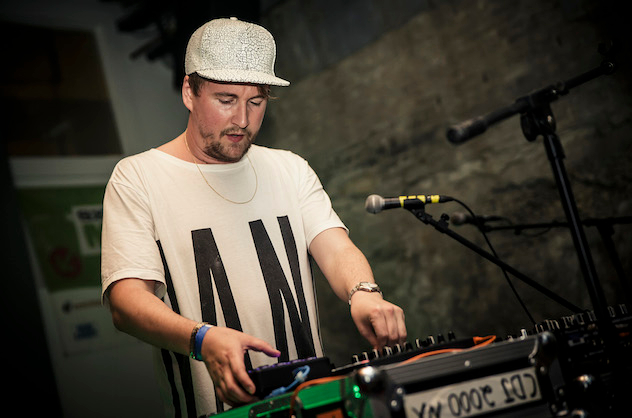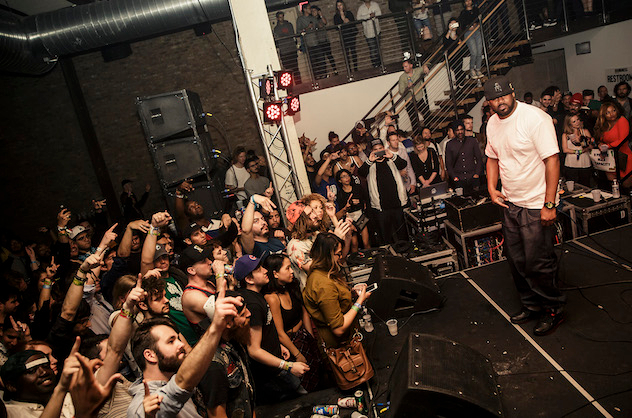- Throwing an electronic music event at SXSW isn't easy. Rooted in indie rock, the ten-day Austin festival doesn't lend itself well to club culture. Most of the venues were built with bands in mind, not DJs, and the programming encourages rapid venue-hopping, meaning it's hard to build a vibe at any one show. Also, the sheer number of artists playing means sets can be as short as 20 minutes. Ninja Tune's showcase last Friday featured one of the most impressive lineups of the festival, and it typified the challenges, as well as the opportunities, that come with throwing a dance party at SXSW.
The action went down at 800 Congress, a cavernous space a few blocks from 6th Street, SXSW's main drag. Nondescript with a solid soundsystem, it wasn't a nightclub, but it did the trick. The venue was remarkably busy from the moment the doors opened at 8 PM, and Brainfeeder young gun Iglooghost opened with a set of rollercoaster drums and staccato vocal samples behind some nifty 3D visuals. By contrast, DJ Paypal spun in total darkness, which only made his assault of high-octane footwork and brutal funk more bewildering, especially considering it was still only 8:30 PM.
 Most of the artists played 30-45 minute sets, which meant that they had to distill their sound down to its essence. Leon Vynehall mixed quickly so as to pack in as many tropical-flavoured jams as he could, while Machinedrum used the opportunity to fire off some frenetic, and impressive, new material, capped off with a performance of Dawn Richard's "Not Above That" featuring Richard herself. Other artists didn't fare as well: Throwing Shade dropped a jumble of incredibly obvious tracks, jumping from Stardust's "Music Sounds Better With You" to New Order's "Blue Monday" to Drake's "Hotline Bling" to Nirvana's "Smells Like Teen Spirit." Taylor McFerrin played a lovely, if oddly timed, set in the middle of the show, his more introspective style awkwardly sandwiched between Throwing Shade's playfulness and Vynehall's deep house.
Sequencing was definitely the night's biggest problem—the music started with footwork and went slower, before Machinedrum came on and reset a higher tempo. The party never hit its stride, which wasn't helped by Ghostface Killah's headline appearance. Instead of his promised 45-minute set, he let an aggressively bad rap-rock band play before him, before his DJ came on and played a handful of golden-era hip-hop classics. Eventually he came out to rap a few songs, but by that time he was already cutting into Moodymann and it hardly felt worth it. Everyone was left scratching their heads.
Most of the artists played 30-45 minute sets, which meant that they had to distill their sound down to its essence. Leon Vynehall mixed quickly so as to pack in as many tropical-flavoured jams as he could, while Machinedrum used the opportunity to fire off some frenetic, and impressive, new material, capped off with a performance of Dawn Richard's "Not Above That" featuring Richard herself. Other artists didn't fare as well: Throwing Shade dropped a jumble of incredibly obvious tracks, jumping from Stardust's "Music Sounds Better With You" to New Order's "Blue Monday" to Drake's "Hotline Bling" to Nirvana's "Smells Like Teen Spirit." Taylor McFerrin played a lovely, if oddly timed, set in the middle of the show, his more introspective style awkwardly sandwiched between Throwing Shade's playfulness and Vynehall's deep house.
Sequencing was definitely the night's biggest problem—the music started with footwork and went slower, before Machinedrum came on and reset a higher tempo. The party never hit its stride, which wasn't helped by Ghostface Killah's headline appearance. Instead of his promised 45-minute set, he let an aggressively bad rap-rock band play before him, before his DJ came on and played a handful of golden-era hip-hop classics. Eventually he came out to rap a few songs, but by that time he was already cutting into Moodymann and it hardly felt worth it. Everyone was left scratching their heads.
 When Moodymann did come on, around 1 AM, 800 Congress was far from full, but those that stuck around were more dedicated to the party than the usual industry-focused crowd (it was one of the few events I attended that week where people were actually dancing). After some technical difficulties, the Detroit don played a crowd-pleasing set of mostly house, featuring tracks by DJ Nature and Noir & Haze. If the programming up until then had been rocky, Moodymann was the perfect way to end the night. His selections found a common ground between the otherwise disparate lineup—between Paypal's futuristic soul, Throwing Shade's anthem-bashing and Vynehall's blissful strains.
When Moodymann did come on, around 1 AM, 800 Congress was far from full, but those that stuck around were more dedicated to the party than the usual industry-focused crowd (it was one of the few events I attended that week where people were actually dancing). After some technical difficulties, the Detroit don played a crowd-pleasing set of mostly house, featuring tracks by DJ Nature and Noir & Haze. If the programming up until then had been rocky, Moodymann was the perfect way to end the night. His selections found a common ground between the otherwise disparate lineup—between Paypal's futuristic soul, Throwing Shade's anthem-bashing and Vynehall's blissful strains.
 Most of the artists played 30-45 minute sets, which meant that they had to distill their sound down to its essence. Leon Vynehall mixed quickly so as to pack in as many tropical-flavoured jams as he could, while Machinedrum used the opportunity to fire off some frenetic, and impressive, new material, capped off with a performance of Dawn Richard's "Not Above That" featuring Richard herself. Other artists didn't fare as well: Throwing Shade dropped a jumble of incredibly obvious tracks, jumping from Stardust's "Music Sounds Better With You" to New Order's "Blue Monday" to Drake's "Hotline Bling" to Nirvana's "Smells Like Teen Spirit." Taylor McFerrin played a lovely, if oddly timed, set in the middle of the show, his more introspective style awkwardly sandwiched between Throwing Shade's playfulness and Vynehall's deep house.
Sequencing was definitely the night's biggest problem—the music started with footwork and went slower, before Machinedrum came on and reset a higher tempo. The party never hit its stride, which wasn't helped by Ghostface Killah's headline appearance. Instead of his promised 45-minute set, he let an aggressively bad rap-rock band play before him, before his DJ came on and played a handful of golden-era hip-hop classics. Eventually he came out to rap a few songs, but by that time he was already cutting into Moodymann and it hardly felt worth it. Everyone was left scratching their heads.
Most of the artists played 30-45 minute sets, which meant that they had to distill their sound down to its essence. Leon Vynehall mixed quickly so as to pack in as many tropical-flavoured jams as he could, while Machinedrum used the opportunity to fire off some frenetic, and impressive, new material, capped off with a performance of Dawn Richard's "Not Above That" featuring Richard herself. Other artists didn't fare as well: Throwing Shade dropped a jumble of incredibly obvious tracks, jumping from Stardust's "Music Sounds Better With You" to New Order's "Blue Monday" to Drake's "Hotline Bling" to Nirvana's "Smells Like Teen Spirit." Taylor McFerrin played a lovely, if oddly timed, set in the middle of the show, his more introspective style awkwardly sandwiched between Throwing Shade's playfulness and Vynehall's deep house.
Sequencing was definitely the night's biggest problem—the music started with footwork and went slower, before Machinedrum came on and reset a higher tempo. The party never hit its stride, which wasn't helped by Ghostface Killah's headline appearance. Instead of his promised 45-minute set, he let an aggressively bad rap-rock band play before him, before his DJ came on and played a handful of golden-era hip-hop classics. Eventually he came out to rap a few songs, but by that time he was already cutting into Moodymann and it hardly felt worth it. Everyone was left scratching their heads.
 When Moodymann did come on, around 1 AM, 800 Congress was far from full, but those that stuck around were more dedicated to the party than the usual industry-focused crowd (it was one of the few events I attended that week where people were actually dancing). After some technical difficulties, the Detroit don played a crowd-pleasing set of mostly house, featuring tracks by DJ Nature and Noir & Haze. If the programming up until then had been rocky, Moodymann was the perfect way to end the night. His selections found a common ground between the otherwise disparate lineup—between Paypal's futuristic soul, Throwing Shade's anthem-bashing and Vynehall's blissful strains.
When Moodymann did come on, around 1 AM, 800 Congress was far from full, but those that stuck around were more dedicated to the party than the usual industry-focused crowd (it was one of the few events I attended that week where people were actually dancing). After some technical difficulties, the Detroit don played a crowd-pleasing set of mostly house, featuring tracks by DJ Nature and Noir & Haze. If the programming up until then had been rocky, Moodymann was the perfect way to end the night. His selections found a common ground between the otherwise disparate lineup—between Paypal's futuristic soul, Throwing Shade's anthem-bashing and Vynehall's blissful strains.